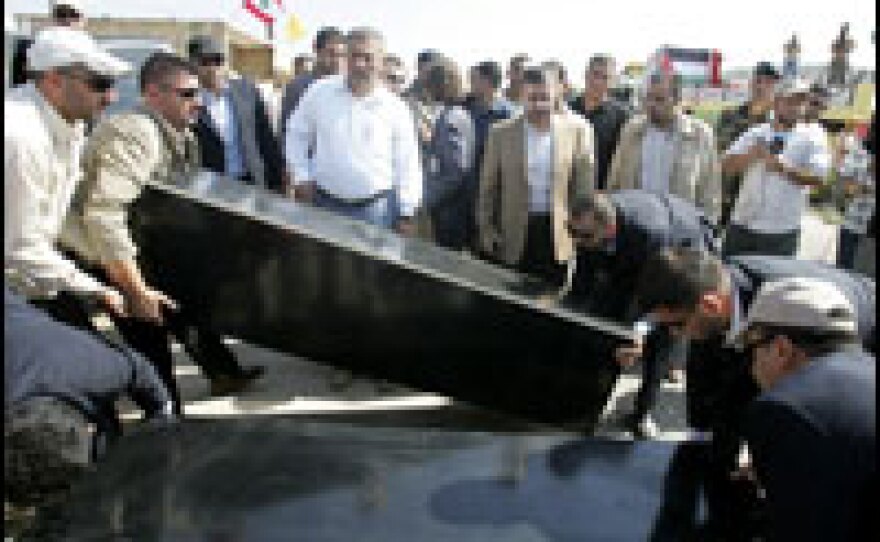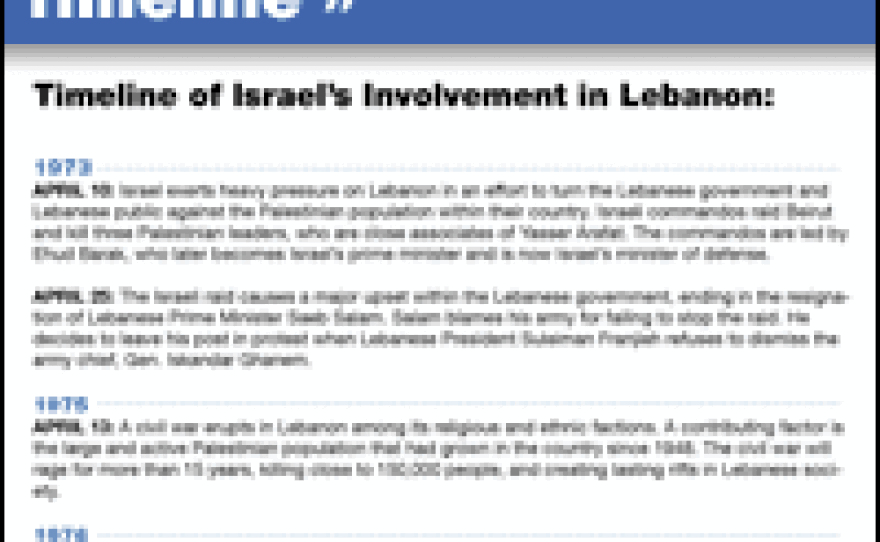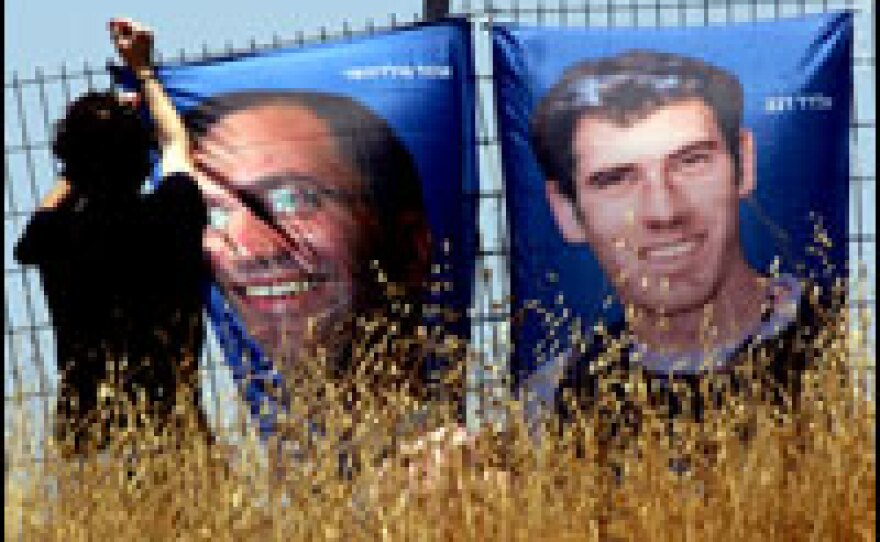

An exchange of prisoners Wednesday between Israel and Hezbollah prompted somber reflection in the Jewish state and celebrations in Lebanon.
Supporters of the Shiite militant group Hezbollah heralded the return to Lebanon of four guerrillas and Samir Kantar, a Lebanese militant, held by Israel. Kantar was convicted of murdering an Israeli man, his 4-year-old daughter and a police officer in a notorious assault nearly 30 years ago.
In exchange, Israel got back the bodies of two of its soldiers whose abduction by Hezbollah in a cross-border attack two years ago sparked a monthlong war, a conflict many believe ended up bolstering the power and popularity of the militant group.
Kidnap That Sparked A War
On July 12, 2006, Israeli soldiers were on a routine border patrol when Hezbollah guerrillas rained machine gun and rocket propelled grenade fire down on their armored jeeps. Three Israeli soldiers were killed on the spot and two others, Ehud Goldwasser and Eldad Regev, were taken captive.
The two were reserve soldiers doing their annual duty in a country where military service is compulsory. After their capture, it was unclear whether they were dead or alive. Hezbollah refused to give any "proof of life" or allow a Red Cross official to investigate.
At the Rosh Hanikra border crossing on the northern coast of Israel on Wednesday, the bodies of Goldwasser and Regev were returned in black coffins via the Red Cross, in a deal arranged with the help of German and United Nations officials.
"Today all of Israel stands with the families of the two soldiers," said David Baker, a spokesman with the office of Israeli Prime Minister Ehud Olmert.
Mickey Liebowitz, a friend of Ehud Goldwasser, has worked for the last two years to bring his friend back to Israeli soil and end "this nightmare." Liebowitz says friends and the families of the soldiers can now start to properly mourn their loss.
"It will be a new journey," he says. "It will be a journey of supporting the families and trying to cope with the news."
A Bitter Finale
For Israel, in many ways, the controversial exchange marked a difficult and bitter finale to this latest round of conflict with Hezbollah.
"It was a mistake to agree to such an exchange," said retired Israeli Major General Ya'akov Amidror. "Israel should not exchange bodies for live terrorists. It's bad because in the future the other side will not have a clear interest to keep alive our soldiers."
Shortly after the July 2006 Hezbollah attack, Olmert gave a nationwide address before parliament in which he said, "Israel will not be held hostage by terror gangs." He said the country would fight until Hezbollah is weakened and its two abducted soldiers returned.
After 34 days of intense fighting, a U.N.-brokered ceasefire took effect with Israel's two soldiers still in captivity and Hezbollah declaring victory. Since the war, Hezbollah has only bolstered its power and popularity among Shiites across Lebanon, say analysts.
United Nations figures say more than 1,000 Lebanese were killed in the 34-day war, many of them civilians. Israel suffered 165 casualties in the conflict, including 121 soldiers and 44 civilians.
Despite insisting that is does not negotiate with terrorists, this is not the first time Israel has swapped prisoners with Hezbollah.
Israel's cabinet overwhelmingly approved the deal earlier this week despite sharp complaints that Hezbollah failed to offer adequate new information about the fate of missing Israeli pilot Ron Arad, as promised under terms of the exchange. Arad was shot down over Lebanon in 1986 and is believed to have been captured alive by the Lebanese Shiite militia Amal. His fate remains a mystery.
While polls here show that most Israelis support the exchange, there is also deep anger that this war, described in a government report as grossly mismanaged, would ultimately also include the release of Samir Kantar.
A Notorious Murderer
Kantar carried out one of Israel's most infamous attacks. In April 1979, Kantar, then 16 years old, and three others slipped into Israel by sea from Lebanon in a rubber dingy. During an attack in the sleepy Israeli port city of Nahariya, Kantar killed a police officer and two members of the Haran family. A third member, a 2-year-old girl, was accidentally suffocated by her mother as she tried to muffle her daughter's crying while hiding in a crawl space.
After dragging two members of the Haran family to the beach, prosecutors say Samir Kantar shot the father, Danny, in front of his 4-year-old daughter, Einat, and then beat the child to death using a rifle and rocks. A second policeman was killed in an ensuing shootout.
Israeli President Shimon Peres, who formally pardoned Kantar last night, called the decision agonizing.
"This is a sad day for me and for the country," Peres said. "On one hand, we have the most terrible murderer. On the other hand, we have our commitment to our boys who were sent to fight for their country. It is our moral duty and our heartfelt wish to see them come back."
Policeman Eliyahu Shahar was the first one killed by Kantar that night in 1979. His brother Ronen Shahar called Kantar's release a national disgrace.
"He took Einat and crushed her head with the rocks on the sea," Shahar said, reflecting on the murder of the 4-year-old girl. "He's some kind of monster. I don't know who can do that."
Ronen Shahar was 9 years old when his brother, the head of the household, was murdered. It shattered his world. His father was absent, and his mother died of a heart attack soon after Eliyahu's murder. Ultimately, he was raised by his teenage sister and later adopted by a family on a kibbutz in the north.
"I've had a very, very hard life since that night [of the murder] and I know today that all my suffering, the one who destroy my life and my family life will go tomorrow and live like a king in Lebanon," Shahar said. "It's a very strange feeling."
While Israel begins to digest and debate the impact of the prisoner swap, funerals are scheduled Thursday for soldiers Ehud Goldwasser and Eldad Regev.
Copyright 2022 NPR. To see more, visit https://www.npr.org. 9(MDAzMjM2NDYzMDEyMzc1Njk5NjAxNzY3OQ001))







